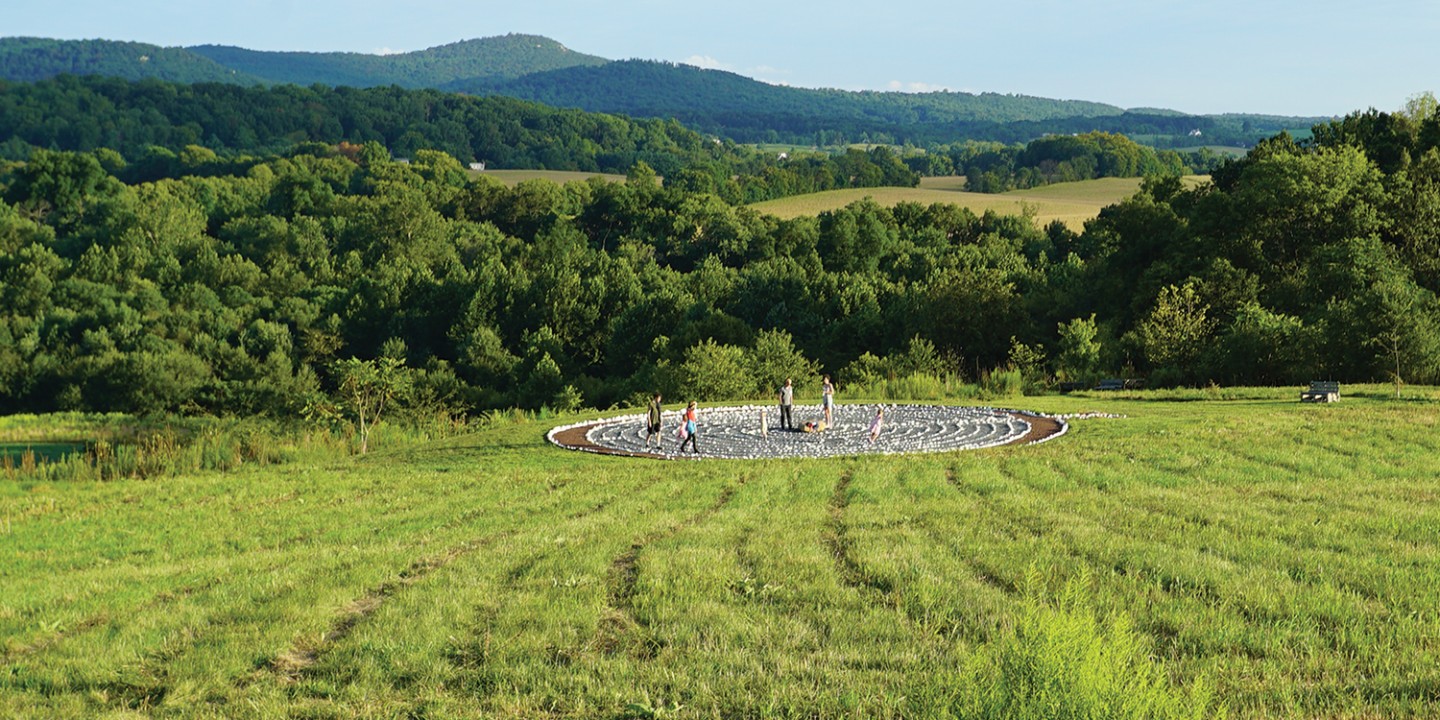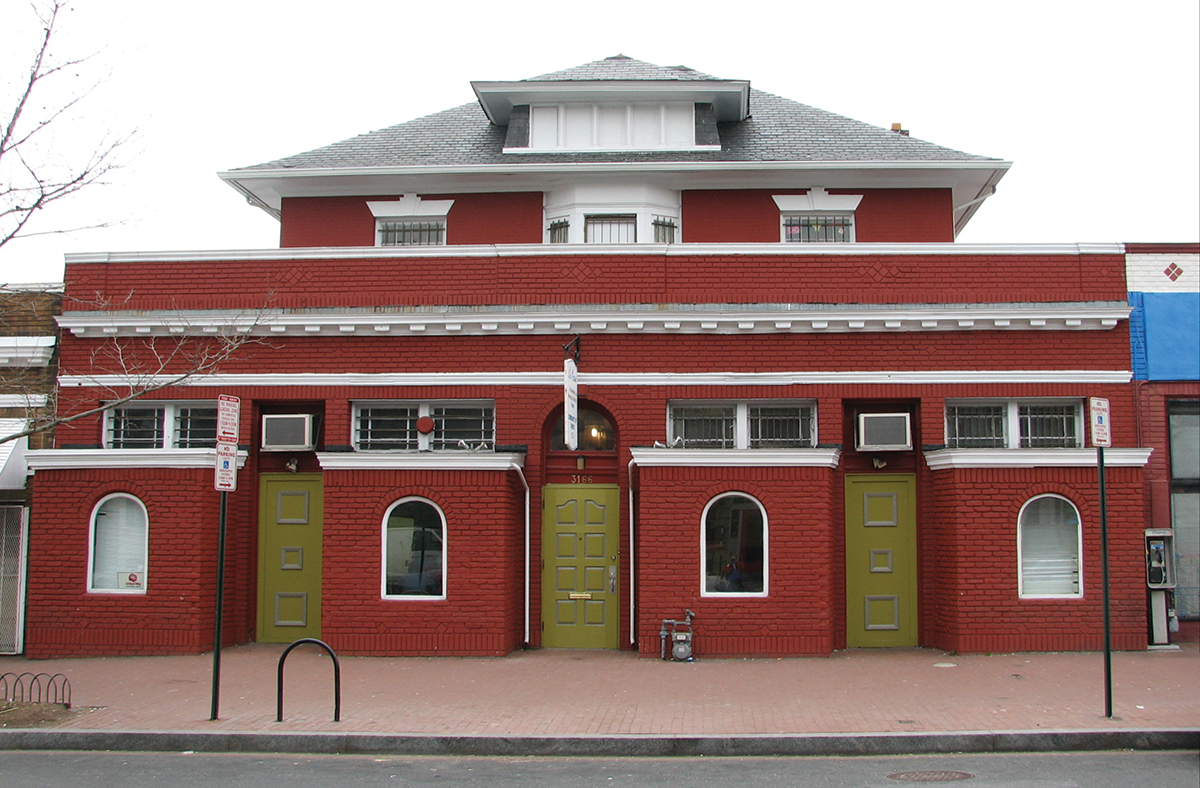My childhood congregation was a progressive Christian dream come true
So why don’t more of the people who grew up there practice Christianity as adults?

Members of the Community of Christ walk a labyrinth at a 50th anniversary reunion in 2016 (Photos by Martin Johnson, Bert Glenn, and Sandra Wojahn, and courtesy of the Community of Christ reunion planning committee)
We stood on a hilltop, near a labyrinth formed in the grass, at the retreat center that was for years an annual destination for the Christian community where we were raised. Now in our 30s and 40s, we gathered with others for the community’s 50th anniversary reunion and final retreat weekend. Later that year it would transfer ownership of its building and hold its final service.
About two dozen of us—mostly born in the late 1960s through late 1980s—spent all or much of our childhood in this community. As we stood talking that weekend in 2016, I felt a kinship even with those I knew least. We hadn’t been able to find anything else like the Community of Christ in our lives, no other place where we felt so at home.
Read our latest issue or browse back issues.
Our ecumenical congregation was open to questions and doubt. It emphasized belonging over belief, and it placed both worship and social justice at the center of its life. Its building, a storefront in a city neighborhood, was first and foremost a community center. But today, the Community of Christ no longer exists—and only a half dozen or so of us who grew up there are still active Christians.
The Community of Christ began in 1965 as a mission congregation of the American Lutheran Church, one of the predecessor denominations of the Evangelical Lutheran Church in America. Cofounders John and Mary Schramm aimed to focus its ministry within a square mile of Washington, DC. While ordained people played a guiding role, the community’s work was shaped by the gifts and dreams of its laypeople. It attracted people who wanted a faith community with many of the good qualities of the churches they had been raised in but without authoritarianism. They came from the Lutheran Church–Missouri Synod, the Roman Catholic Church, plain-dressing Mennonites (my parents’ background), and elsewhere. The community became a place where those with spiritual wounds could begin to heal and parents could raise their children without dogmatism. They avoided the word church, seeing it as tied to forms of institutional religion that they were trying to move away from.
Larry Rasmussen, a social ethicist who belonged to the Community of Christ for 14 years, sees it as an example of the kind of community that is essential to church and society as he envisions it. Such communities are sacred places where people share power in an egalitarian way of life, deliberating the most controversial issues together and creating “a genuine sanctuary,” he writes in Moral Fragments and Moral Community. “They are havens for the people who belong to them,” he told me. “But they are not havens to get away from the world, but where you can risk things together with some joy and some adventure because you feel safe with one another.”
The Community of Christ was a haven for me as a child, and yet the other children and I were not sheltered there. We were embraced yet free to roam. It was the safest place I knew. I could make mistakes and yet know I was unconditionally loved. I knew it beyond words—the adults showed it more than said it.

The Community of Christ building in Washington, DC.
As I entered divinity school and then ordained ministry, some of those same adults voiced a question that needled them: Why didn’t more of the people who grew up in the community practice Christianity as adults?
I wondered if my peers had a vastly different experience with the Community of Christ than I did. Or is even growing up well loved by a welcoming congregation simply not enough, in our current cultural context, to motivate people to persevere in finding one as adults? These questions were in the background as I interviewed younger former members for a history of the Community of Christ I recently wrote. I braced myself for the possibility that I might unearth stories of deep wounding caused by the community.
But there were no stories of spiritual harm—quite the contrary. “I felt very loved and supported every Sunday,” Lindsey Pohlman said. “I could find other adults that were not my mom and dad to go to and talk to them about stuff that was going on in my life.” The youth group we were both part of felt like a safe space, she said, as did services in the building the community owned and ran as a neighborhood center.
Several people told me about how they looked forward to Sundays as children and how their early formation in the community shaped their vocation.
Marguerite Lee’s earliest memories of Christian life are in the homes of people from the Community of Christ. “I just remember that closeness,” she said, “being present and way more than . . . just a church.” She joined the community as an infant, after her mother adopted her from India. Her mother was single for the first three years of Marguerite’s life, and the community embraced both of them. Members took shifts caring for Marguerite during a life-threatening illness when she first arrived in the United States and needed to have an adult with her 24 hours a day. And the community’s focus on social justice contributed to Marguerite becoming a social worker.
“When I think about what’s important and where and how I should be guiding my life,” said Andy Rasmussen (Larry’s son), “I think about that group of people.” He sees how difficult it is to find or re-create that kind of community. “The Community of Christ,” he said, “was a really special place.”
By the time we were teenagers, some of us who grew up in the Community of Christ were already seeing other churches as less than. Andy moved with his parents to New York in 1986 when his father got a job as a professor at Union Theological Seminary. When they started attending a more traditional Lutheran church, Andy was resistant. This was partly because he didn’t want to get out of bed early. But he also knew he could strike a chord with his parents by asking, “How can I go to a church like that after going to a church like the Community of Christ?”
Karen Martin-Schramm, one of John and Mary Schramm’s four children, spent formative years in the Community of Christ from 1965 to 1972. Karen felt valued as a full member, with a clear sense that children didn’t have to stay on the sidelines. She helped lead music in worship, playing the ukulele because her small hands couldn’t reach around the neck of a guitar. She still embraces the community’s approach to being a Christian congregation that requires a deep level of involvement in one’s neighborhood and the world. She has been active in congregations since childhood but has never found one that seems to be engaged in the same way. The Community of Christ “spoiled me for future churches,” she said.
Like Karen, I have found other congregations to lack what we had at the Community of Christ, and I’ve been disappointed. Although I have been part of one congregation or another almost continuously as an adult, each has offered only parts of the whole that made me feel such a strong sense of belonging at the Community of Christ. The absence of certain pieces has sometimes even felt like an affront. So when my peers recounted times they visited congregations and had similar reactions to mine, I couldn’t blame them for not persevering.
I did wonder if they were creating community elsewhere instead. David Hollinger’s research suggests that this is broadly the case among people who grew up in liberal Protestant churches. “Parents were likely to encourage children to explore their world and make their own decisions about it,” the historian writes in Christianity’s American Fate. “They did just that, and they took advantage of the expanding opportunities to form communities beyond the churches.”
Jessica Grose recently wrote a series about the religiously unaffiliated. The New York Times writer invited responses from people who had left organized religion, asking them questions including what now took the place of religious practice in their lives. In the more than 7,000 responses she received, the most common answers were meditation and enjoying the outdoors.
Many of the people raised in the Community of Christ fit right in with those described by Hollinger, Grose, and others. One, for example, has found relationships both with a higher power and with other people through a 12-step group. He told me that he is grateful for the seeds our community planted that allow him to appreciate these relationships.
Grose reports that at least one of her respondents, however, “hasn’t found something to satisfyingly replace what she has lost.” I heard something similar from several former Community of Christ members. They said that they long for a depth of connection they lack in their adult lives. They see friend groups and other circles they’re part of as unable to organize or sustain support in the face of life’s biggest challenges. They wonder how to find people who share life together like their families did in the community.
After Doug Huron was diagnosed with primary lateral sclerosis—a slower-progressing cousin to ALS—and began to lose his physical abilities, the Community of Christ provided support. “I think about that sometimes in my own life,” his son Amos told me. His close friends offer care in tough times, but they relate to him mostly individually. “The community had this ability to act both as a bunch of individual people and as an organization,” Amos said. He likened it to a group of superheroes. When someone was threatened by hardship, a community member would sound the call: “Activate!”
Alicia Koundakjian Moyer learned from the Community of Christ’s shared joys and concerns during worship that suffering was not something to be feared. “There was a lot of space around sadness in our community; there was never a numbing of it or a fleeing from it,” she said. “We did hard things together as a result. Nobody abandoned anyone else to go through it alone.” She thought about what it would be like if she went through a crisis like those that community members went through over the decades. It would feel frightening, she said, and “too hard to talk about.” People in her circles might not know how to help, where to come in. For people going through a crisis, she observed, the worst question is often, “Is there anything I can do for you?” because it’s hard to even think of what someone could do to help. In the Community of Christ, “there was an intimacy in the group that people would just know what needed to be done.”
Cyrus Hampton encounters people in activist circles who disdain religion, especially Christianity. Yet because of the Community of Christ he knows that Christian faith can be a tool of “exploration, questioning, embracing self-doubt, embracing self-criticism.” He understands religious community as creating a distinct space in which sharing life’s sorrows and joys can enrich conversation on more abstract or mundane subjects.
But a lot of people associate Christianity instead with hypocrisy and bigotry. For some who grew up in the Community of Christ, an obstacle to joining a congregation is that their spouses had hurtful experiences of religion. Grose notes the “convincing body of research showing that the connection between right-wing politics and some Christians that drew closer in the 1980s and early ’90s pushed other liberal and moderate Christians away from religion.”
Others who grew up in the Community of Christ struggle to find people to go to church with them and don’t want to go alone. That has been a challenge for Kaisa Nichols-Russell, now in her late 20s, who recently told me, “I miss Community of Christ services.” I’ve known Kaisa since she was born, and when she was a college student in Chicago, I was a kind of mentor to her. At one point I was working on a century article about Gilead Church, which includes Moth-style storytelling in worship (see “Every story is a God story,” April 24, 2019), and I invited Kaisa to attend a service with me. The highlight for her was not the storytelling but simply singing together.
Cyrus’s first memories of the community involve singing together. “The singing was really evidence of a sort of underlying communality,” he observed. It’s also what comes to mind when someone says to him, Oh, you grew up in a church? You don’t seem like you grew up in a church. What was it like? He thought of how everyone took part, whatever their musical ability. There was no notion, he said, of “who are the good singers? We’re only going to look to them. But instead all these folks, everyone in the community, we want all of you to be involved.” He saw this communality as well in the way everyone was welcome to bring their questions, concerns, and hopes to worship and meeting alike, even if it caused discomfort.
Weekly worship at the Community of Christ was a collective creation. Alicia remembered Holy Week as a central example: the week’s services brought together the gifts of several lay leaders. “That was the best thing that I think that we did as a community collectively,” she said.
Good Friday was one of her favorite services of the year, Alicia wrote in a message to her yoga and meditation students. The services taught her the value of ritual in creating intentional space for shared experience in community. “For a kid often told she was too sensitive,” Alicia wrote, “I relished the chance to cry openly about something bigger than my personal problems, surrounded by so many others allowing their tears to freely flow. To be together with our open wounds and not try to fix or numb or hurry the process of healing them.”
In my experience, this collective creation quality is characteristic of faith-based communities more than of other kinds of gatherings. There’s a difference between doing something in a group—a running club, for example—and each contributing to something that is greater than the sum of its parts.
I shared that thought with Alicia. She pointed out that for many people who grew up religious, going to church was a lot like practicing yoga on our separate mats in a drop-in class: simply an experience of being in a group where everyone is doing the same thing. Alicia’s approach to teaching yoga is influenced by growing up in our congregation. She sees her yoga studio as a kind of community center—like the Community of Christ building was in the same neighborhood. Alicia seeks to gather groups who commit to attending weekly—or as close to it as possible—to seek transformation together. She faces some of the same challenges as any of us leading communities in the present cultural and economic climate. Her advanced class is an hour and a half each Saturday morning, “which feels like an enormous ask.”
Amos, now a father of two in his mid-40s, reflected on the “astonishing” amount of effort our parents and other adults put into holding the Community of Christ together for decades. (“I can barely get laundry done in a timely manner,” he said.) “A lot of us who grew up in it,” he observed, “have to spend time trying to re-create that in our own lives and realize that it’s really difficult—and that we were really fortunate to be the beneficiaries of that.”
The work of community—learning to know others beyond a surface level, persevering when disappointments or conflicts arise—takes emotional resources along with time. We who grew up in the Community of Christ aren’t the only ones who long for an inclusive community in which intergenerational relationships last for decades. But our peers who haven’t experienced such a thing, or not to the same extent, may not have the same problem of applying such high expectations to any group they encounter.
Yet it’s also striking to me that many of the things we loved about the Community of Christ are true as well of many churches today, especially many new communities: meeting somewhere other than a traditional church building, fostering a social life together, accepting people as they are—not just welcoming people in all the facets of their identities but allowing them to be messy, to not have everything figured out.
The handful of us who are now part of a congregation don’t seem to have anything else in common—that is, nothing that distinguishes us from others who grew up in the Community of Christ. All of us are subject to the cultural forces that make practicing any faith increasingly at odds with the people around us. It’s challenging for any of us to go against the flow.
Marguerite—who said to me plainly, “I’m Christian, and we attend church regularly”—went “through different stages” with religion. She attended a Unitarian Universalist congregation for a time. When she became a mother, she thought through what she wanted her children to see and experience, even as she knew that ultimately they could choose what to believe. “That helped to be a catalyst, too,” she said. “My faith is very important to me now.” She lives in a conservative area in Tennessee, which she finds challenging. But she and her children—now young adults—found a nondenominational church that, in her experience, accepts people as they are.
I often ask myself why I continue to seek out life together with other Christians, especially after a church wounded me deeply when I was in my 30s. Perhaps it’s a hunger joined to a hope that someday it will again be satisfied. Perhaps it’s a lingering piece of the combativeness I learned as a child: I want to fight against the perception of Christianity as represented by culture warriors and nationalists. Some days, I think it’s one of the few experiences in my life I’d call a miracle. The one thing I can say for certain is that for me, every part of being a Christian was shaped by growing up in the Community of Christ.






